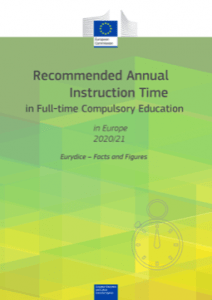indireinforma

 Effective learning depends on many factors but undoubtedly the instruction time available to students plays a fundamental role. Alongside the quality of education and the time available for study, also after school hours, the increase in the time allocated to teaching a subject can in fact contribute to increasing students’ interest in a given subject, with a positive influence on the results obtained.
Effective learning depends on many factors but undoubtedly the instruction time available to students plays a fundamental role. Alongside the quality of education and the time available for study, also after school hours, the increase in the time allocated to teaching a subject can in fact contribute to increasing students’ interest in a given subject, with a positive influence on the results obtained.
But how much time do students spend at school studying basic subjects, and how do instruction time vary in Europe? The new Eurydice network report “Recommended Annual Instruction Time in Full-time Compulsory Education in Europe 2021-2021” provides an overview of the minimum recommended instruction time by education level and for four main subject areas (reading; writing and literature; mathematics; natural sciences and social sciences) in general compulsory education in 37 European countries. The data refer to the minimum requirements established for the compulsory curriculum by the competent authorities of 39 education systems for the school year 2020/2021.
The analysis shows that the minimum instruction time tend to increase with the level of education and the differences between countries become less significant. At primary level, the attention for most countries is devoted to reading, writing and literature (about 25% of the total time), while in secondary education the teaching of mathematics and natural sciences acquires equal importance.
National figures and diagrams help to understand immediately the differences in instruction time by level of education and by subject area. Data collection was carried out jointly by the Eurydice and NESLI (OECD) networks.
What is Eurydice?
Eurydice is the European network that collects, updates, analyses and disseminates information on the policies, structure and organization of European education systems. Established in 1980 on the initiative of the European Commission, the network is made up of a European unit based in Brussels and various national units. Since 1985, the Italian national unit has been established at Indire.
Other useful links:
- Eurydice website – Italian national unity
- Eurydice site – European Central Unit
- All publications of the network

